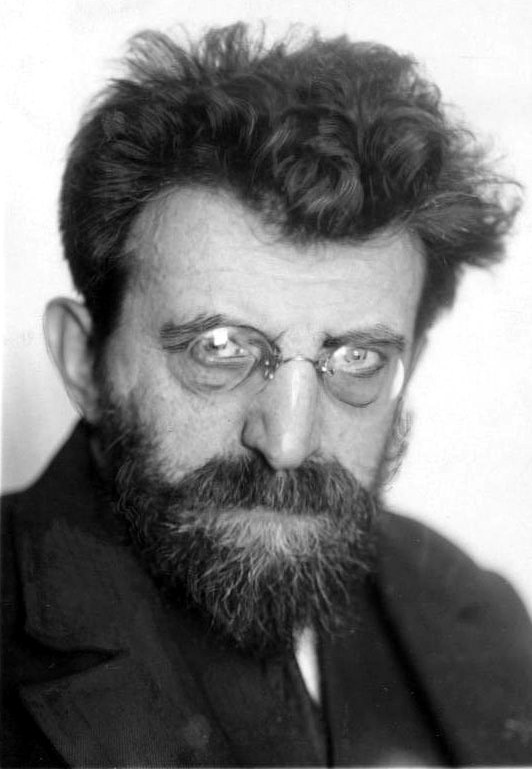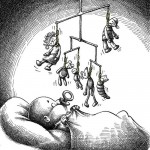Erich Mühsam: a short life for anarchism and poetry

Erich Muehsam was born in Berlin on April 6, 1878. While his brother Hans became a physician and his sister Charlotte married Leo Landau, a lawyer, Erich chose a different path and became an anarchist author, poet, and publisher. He was imprisoned from 1917-1918 for refusing military service, and from 1919-1924 for his role in the short-lived Bavarian Soviet Republic.
Muehsam published many anarchist books, plays, and periodicals. He was also successful as a writer and performer in cabarets. An early critic of the Nazi regime, in 1934 he was arrested and sent to the Oranienburg concentration camp, where he was murdered on July 10, 1934. After the death of her husband, Kreszentia (Zenzl) Muehsam fled first to Prague and later to Moscow, on the invitation of the Internationale Rote Hilfe (International Red Aid). Imprisoned in 1938, she was eventually sent to Siberia and released in 1955. She then settled in East Berlin, where she died in 1962.
Mühsam specifically targeted his writings to satirize the growing phenomenon of Nazism, which later raised the ire of Hitler an Goebbels. Die Affenschande (1923), a short story, ridiculed the racial doctrines of the Nazi party, while the poem Republikanische Nationalhymne (1924) attacked the German judiciary for its disproportionate punishment of leftists while barely punishing the right wing participants in the Putsch.
In 1928, Erwin Piscator produced Mühsam’s third play, Staatsräson (For reasons of State), based upon the controversial conviction and execution of Nicola Sacco and Bartolomeo Vanzetti in the United States.
In 1930, Mühsam completed his last play Alle Wetter (All Hang), which sought mass revolution as the only way to prevent a radical Right-wing seizure of power. This play, never performed in public, was directed exclusively at criticizing the Nazis who were on the rise politically in Germany.
Arrest and death
Mühsam was arrested on charges unknown in the early morning hours of 28 February 1933, within a few hours after the Reichstag fire in Berlin. Joseph Goebbels labelled him as one of “those Jewish subversives.”
Over the next seventeen months, he would be imprisoned in the concentration camps at Sonnenburg, Brandenburg and finally Oranienburg. He was exposed to torture heavily:
“After breaking his teeth with musket blows; stamping a swastika on his scalp with a red-hot brand; subjecting him to tortures which caused him to be taken into a hospital, even now the fascist hyenas of the Sonninburg concentration camp continue their beastly attacks upon this defenseless man. The last news are really atrocious: the Nazi forced our comrade to dig his own grave and then with a simulated execution made him go through the agony of a doomed man. Although his body has been reduced to a mass of bleeding and tumefied flesh, his spirit is still very high: when his traducers tried to force him to sing the Horst-Wessel-Lied (the Nazi’s anthem) he defied their anger by singing the Internationale.” Mühsam, Erich (2001). David A. Shepherd
The beatings and torture continued, until finally on the night of 9 July 1934, Mühsam was tortured and murdered by the guards, his battered corpse found hanging in a latrine the next morning. An official Nazi report dated 11 July stated that Erich Mühsam committed suicide, hanging himself while in “protective custody” at Oranienburg. In fact it is proven by historians, that he was murdered.
Listen to “Lumpenlied”:
Related Posts
Tags: Anarchism, Erich Mühsam, germany, History, Sabine Küper-Büsch, Subversives, urban chant
Trackback from your site.




